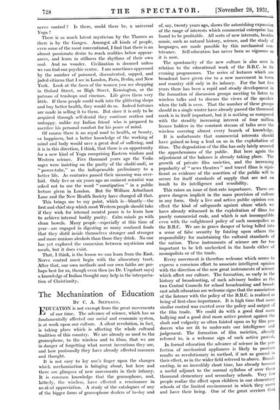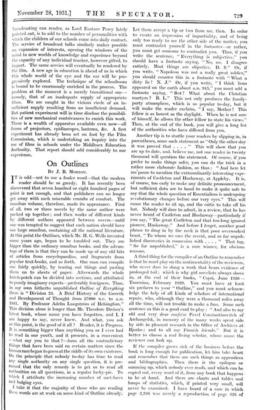The Mechanization of Education
BY C. A. SIERMANN. EDUCATION is not exempt from the great movements of our time. The advance of science, which has so fundamentally affected our social and economic system, is at work upon our culture. A silent revolution, in fact, is taking place which is affecting the whole cultural tradition of this country. We are already so used to the gramophone, to the wireless and to films, that we are in danger of forgetting what recent inventions they are, and how profoundly they have already affected maimers and thought.
It is not easy to lay one's finger upon the changes which mechanization is bringing about, but here and there are glimpses of new movements in their infancy. It is common knowledge that the gramophone, and, latterly, the wireless, have effected a renaissance in nu,si2a1 appreciation. A study of the catalogues of any of the bigger firms of gramophone dealers of to-day and of, say, twenty years ago, shows the astonishing expansion of the range of interests which commercial enterprise has found to be profitable. All sorts of new interests, besides music, such as natural history, science, and the study of languages, are made possible by this mechanical con. trivance. Self-education has never been so vigorous as it is now.
The spontaneity of the new culture is also seen in relation to the educational work of the B.B.C. in its evening programmes. The series of lectures which are broadcast have given rise to a new movement in town and country still only in its infancy. For the last five years there has been a rapid and steady development in the formation of discussion groups meeting to listen to wireless talks and to discuss the views of the speaker when the talk is over. That the number of these groups should in a single winter have already passed the thousand mark is in itself important, but it is nothing as compared with the steadily increasing interest of four million licence holders in the constant stream of talks over the wireless covering almost every branch of knowledge.
It is unfortunate that commercial interests should have gained so long a lead on us in the exploitation of films. The degradation of the film has only lately aroused the apprehensions of the public. But here again the adjustment of the balance is already taking place. The growth of private film societies, and the increasing popularity of " news theatres " and travel films is signi- ficant as evidence of the assertion of the public will to secure for itself standards of supply that are not as insult to its intelligence and sensibility.
This raises an issue of first-rate importance. There are grave dangers implicit in the mass provision of culture in any form. Only a live and active public opinion can effect the kind of safeguards against abuse which we have already witnessed in the exploitation of films for purely commercial ends, and which is not incompatible even with the enlightened policy of such monopolies as the B.B.C. We are in grave danger of being lulled into a sense of false security by foisting upon others the responsibility for maintaining the cultural standards of the nation. These instruments of science are far too important to be left unchecked in the hands either of monopolists or of the trade.
Every movement is therefore welcome which seems to express a conscious effort to associate intelligent opinion with the direction of the new great instruments of science which affect our culture. The formation, so early in the history of broadcasting, of such advisory bodies as the two Central Councils for school broadcasting and broad- cast adult education are welcome signs that the association of the listener with the policy of the B.B.C. is realized as being of first-class importance. It is high time that some similar control was exerted over the policy and output of the film trade. We could do with a good deal more bullying and a good deal more active protest against the slush and vulgarity so often foisted upon us by film pro- ducers who see fit to under-rate our intelligence and judgement. The formation of film societies, already referred to, is a welcome sign of such active protest, In formal education the advance of science in the per- fection of mechanical appliances is likely to produce results as revolutionary in method, if not as general in their effect, as in the wider field referred to above. Broad- casting, in an incredibly short time, has already become a useful adjunct to the normal syllabus of over three thousand elementary and secondary schools. Very few people realize the effect upon children in our elementary schools of the limited environment in which they move and have their being. One of the great ,services that broadcasting can render, as Lord Eustace Percy lately pointed out, is to add to the number of personalities with which the children of our schools come into daily contact. The service of broadcast talks similarly makes possible an expansion of interests, opening the windows of the mind to new worlds of knowledge and experience beyond the capacity of any individual teacher, however gifted, to impart. The same service will eventually be rendered by the film. A new age in education is ahead of us in which this whole world of the eye and the ear will be pro- gressively explored. The technique of the schoolroom is bound to be enormously enriched in the process. The problem at the moment is a merely transitional one— namely, that of an inadequate supply of appropriate films. We are caught in the vicious circle of an in- sufficient supply resulting from an insufficient demand. But patient experiment will in time disclose the possibili- ties of new .mechanical contrivances to enrich this work. There is a wealth of apparatus available even now—all forms of projectors, epidiascopes, lanterns, &e. A first experiment has already been set on foot by the Film Commission, which is undertaking an inquiry into the use of films in schools under the Middlesex Education Authority. That report should add considerably to our experience.







































 Previous page
Previous page